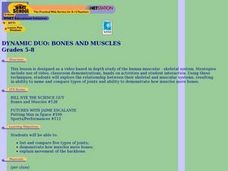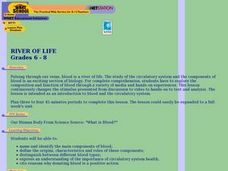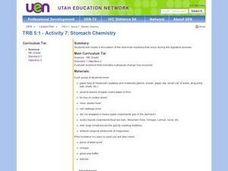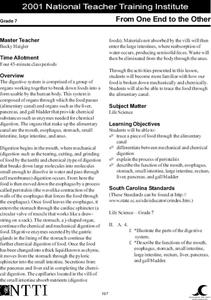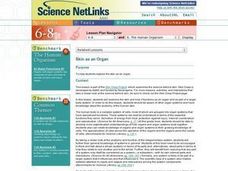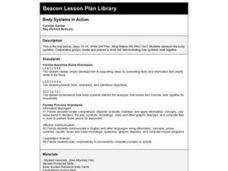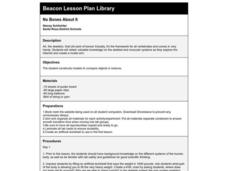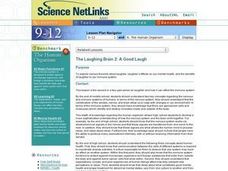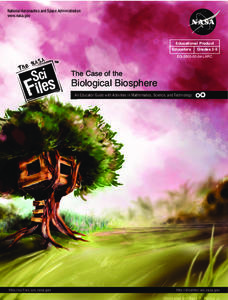Curated OER
How To Make an Artificial Organ
Students examine the advances made in technology with regard to prosthetics and replacement organs and limbs. They describe the anatomy and functions of different organs and create their own artificial organ. They defend and present...
Curated OER
Dynamic Duo: Bones and Muscles
Students explore the relationship between their skeletal and muscular systems, resulting in ability to name and compare types of joints and ability to demonstrate how muscles move bones.
Curated OER
River of Life
Students explore the composition and function of blood through a variety of media and hands-on experiences. This lesson is a very good introduction to blood and the circulatory system.
Curated OER
T's Alive! Or Is It?
Students explore data on the bone, muscle, and skin of living systems and then create a list of characteristics of these systems and relate these characteristics to bone, muscle, and skin.
Curated OER
Decisions Today for a Healthy Tomorrow
Students explore a variety of factors that affect the health of the bone, muscle, and skin systems. Healthy lifestyle recommendations which include behaviors over which we have control are explored in this lesson.
Curated OER
Stomach Chemistry
Fifth graders compare physical and chemical changes. They perform a simulation experiment/activity that replicates what happens in the stomach as food is digested by stomach acids.
Curated OER
It May Be Yucky, But Someone Has To Teach It. . .
Fourth graders study the names and parts of the excretory system in this hands-on activity. They use common items to make a model of the system.
Curated OER
Biomechanics of Sports
Young scholars examine the body's major organ systems and how they function and influence each other. They examine how the human body moves when involved in sports.
Curated OER
From One End to the Other
Seventh graders trace a piece of food through the digestive system. They describe the functions of the mouth, esophagus, stomach, etc.
Curated OER
Skin as an Organ
Students are introduced to human skin as an organ of the body with many roles, functions and interactions with other organs. They investigate the integumentary system in groups and complete a worksheet with their findings.
Curated OER
What's Inside
Students become more familiar with life science in the context of the scientific method which helps them to become familiar with the various kinds of life science diagrams they may see on a GED science test.
Curated OER
Mind Games
Learners design a prototype game as they simulate being game designers for a major corporation. They base the game on the major body systems.
Curated OER
HOW BODY SYSTEMS INTERACT
Students study that the human body is made up of different systems whose functions are related. They draw and label their traced body outlines which include at least five body systems.
Curated OER
Body Systems in Action
Fifth graders, in groups, create a short skit that shows how body systems work together.
Curated OER
No Bones About It
Students conduct Internet research on the different parts of the skeletal system. Then they create a model arm that demonstrates how muscle and bone work together to create movement.
Curated OER
THE LAUGHING BRAIN 2: A GOOD LAUGH
Learners explore various theories about laughter, laughter's effects on our mental health, and the benefits of laughter to our immune system.
Curated OER
The Human Body Lesson
Students identify features of the human body, explore needs of the human body by explaining the importance of good health in relationship to the body, and study functions and care of the human body and its organs.
Curated OER
Journey through the Digestive System
Learners work in cooperative groups to design a theme park called Gastro World, based on the anatomy and physiology of the digestive system. They prepare a portfolio of the park's attractions and construct a model of it.
Curated OER
MuscleMania
Students learn three different types of muscles. By building a model of the arm, they learn its basic anatomy and how muscles function in relationship to bones. They perform an experiment on the relationship between muscle size and...
Curated OER
Your Beating Heart - Circulatory System
Young scholars illustrate a schematic circulatory system of a human body including heart, lungs, arteries, veins and capillaries. Next, students conduct an experiment to increase understanding of the relationship between heart rate/pulse...
Curated OER
The Beat Goes On
Students take their own pulse before and after exercise as they explore how the heart works. They research various ways that heart disease is treated and suggest specific treatment methods for their own imaginary patients.
Curated OER
The Case of the Biological Biosphere: Health, Math, Technology
Young scholars investigate various aspects of the human body in this imaginative Tree House Detective episode about the biological biosphere. In a series of They take measurements, analyze data, and use technology. The lessons revolve...
Curated OER
Stretching Muscles Properly
Tootsie rolls as a teaching aid? Absolutely. Demonstrate to young athletes the importance of warmups and stretching with an activity that asks them to try and stretch a piece of cold taffy. Class members hold the taffy in their hands...
Curated OER
Digestive System, a Kinesthetic Lesson
Students actively act out an aspect of the digestive tract on two parallel strips of tape on the floor 3-4 feet apart and width of classroom which represent the digestive tract.



